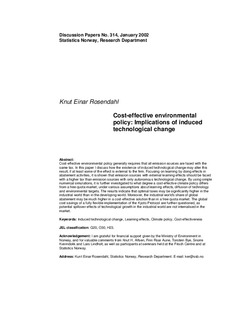| dc.contributor.author | Rosendahl, Knut Einar | |
| dc.date.accessioned | 2011-11-26T17:49:30Z | |
| dc.date.available | 2011-11-26T17:49:30Z | |
| dc.date.issued | 2002 | |
| dc.identifier.issn | 1892-753x | |
| dc.identifier.uri | http://hdl.handle.net/11250/180717 | |
| dc.description.abstract | Abstract:
Cost-effective environmental policy generally requires that all emission sources are faced with the same tax. In this paper I discuss how the existence of induced technological change may alter this result, if at least some of the effect is external to the firm. Focusing on learning by doing effects in abatement activities, it is shown that emission sources with external learning effects should be faced with a higher tax than emission sources with only autonomous technological change. By using simple numerical simulations, it is further investigated to what degree a cost-effective climate policy differs from a free quota market, under various assumptions about learning effects, diffusion of technology and environmental targets. The results indicate that optimal taxes may be significantly higher in the industrial world than in the developing world. Moreover, the industrial world's share of global abatement may be much higher in a cost-effective solution than in a free quota market. The global cost savings of a fully flexible implementation of the Kyoto Protocol are further questioned, as potential spillover effects of technological growth in the industrial world are not internalised in the market.
Keywords: Induced technological change, Learning effects, Climate policy, Cost-effectiveness | no_NO |
| dc.language.iso | eng | no_NO |
| dc.publisher | Statistics Norway, Research Department | no_NO |
| dc.relation.ispartofseries | Discussion Papers;No. 314 | |
| dc.subject | Environmental policy | no_NO |
| dc.subject | Technological changes | no_NO |
| dc.subject | Climate policy | no_NO |
| dc.subject | Emission | no_NO |
| dc.subject | JEL classification: Q20 | no_NO |
| dc.subject | JEL classification: O30 | no_NO |
| dc.subject | JEL classification: H23 | no_NO |
| dc.title | Cost-effective environmental policy: Implications of induced technological change | no_NO |
| dc.type | Working paper | no_NO |
| dc.subject.nsi | VDP::Social science: 200::Economics: 210::Economics: 212 | no_NO |
| dc.source.pagenumber | 38 s. | no_NO |
